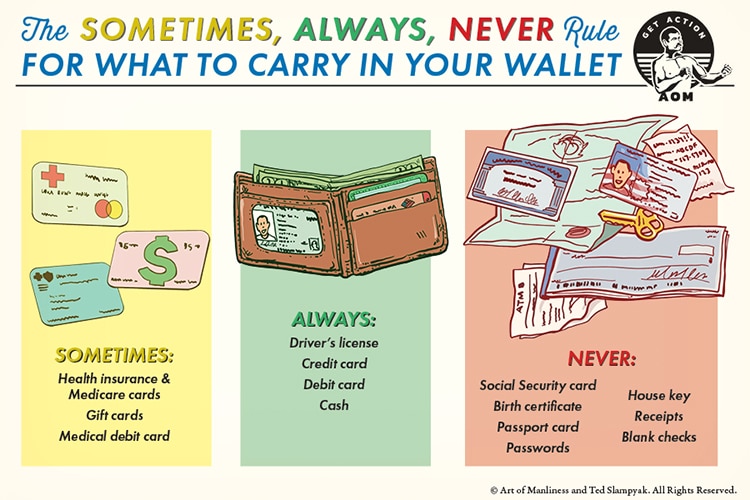
Your wallet is an essential part of your EDC. It carries your identification and your means of payment. In the past few decades, wallet profiles have been getting thinner and thinner. Men don’t want to sit on a George-Costanza-sized lump all day. Moreover, carrying too much stuff in your wallet can be a security risk: if you lose your wallet and it contains sensitive information, you put yourself at risk for identity theft.
So what should you put in and leave out of a wallet to ensure you have the essentials, while also keeping things streamlined and reducing your security risk?
Below we share the items you should sometimes, always, and never keep in your wallet.
Sometimes
Some items should only be kept in your wallet on an as-needed basis. Keeping them in your wallet all the time creates a higher security risk, and they needlessly take up space.
Health insurance cards/Medicare cards. A thief can use your health insurance card or Medicare card to get procedures done in your name, potentially sticking you with the bill, messing up your health records, or even increasing the cost of your insurance. You only need to bring your health insurance card to your medical appointments. You usually don’t even need it then, as the doctor’s office keeps a copy of your card on file, but every once in awhile they update their records and want to see your card again, so it doesn’t hurt to always bring it.
You might think that you need to always carry your health insurance cards on you in case you end up making an unexpected visit to the emergency room. Not so. A hospital will still treat you if you don’t have your insurance card. You’ll just need to get the hospital your insurance info later.
Save space in your wallet and reduce your fraud risk by carrying your health insurance cards only when needed.
Medical debit card. Your medical debit card is another sometimes item for the same reasons your health insurance card is: to avoid medical fraud and reduce your wallet profile.
Gift cards. You might keep a gift card in your wallet just in case you decide that today’s the day you’re finally going to hit The Cheesecake Factory for dinner. But, you’re probably not, so it’s just taking up needless space in your wallet. What’s more, gift cards don’t need IDs to be redeemed, so if your wallet gets stolen, a thief could use that $100 gift card from Grams to treat themselves to a cheesecake-crowned feast. Only put a gift card in your wallet when you know you’re going to use it in the immediate future.
Always
Driver’s license. Got to have this on you by law when you’re driving. Getting pulled over when you don’t have your license may just lead to a “fix-it ticket” where if you later show proof of your valid license, the citation will be dismissed. But you definitely want to skip having to show up in traffic court to get that taken care, so always keep your license with you.
Credit card. Don’t carry multiple credit cards. Just keep one in there that you use the most. Stick with a credit card accepted at most retailers, like Visa or American Express. Not only will this reduce bulk in your wallet, but if you lose your wallet, you won’t have to cancel multiple cards.
Debit card. Debit cards are essential for making payments from your checking account and withdrawals from ATMs. Ensure you have fraud alerts and daily spending limits to reduce debit card fraud.
Cash. A man should always have some greenbacks on him. Carry $100-$300; enough to cover most cash-only transactions that may arise, but not so much that you’ll lose big if your wallet gets stolen.
Never
Social Security card, birth certificate, passport card. No brainer. You rarely need these documents for identification purposes, and they can all be used for identity fraud. Keep them at home.
Passwords. Don’t be a dummy and store passwords for personal or work services in your wallet. You’re just asking to become a fraud victim. Protect your online privacy.
House key. If your wallet gets stolen, the thief will now have both the key to your house and (thanks to your driver’s license) its address. Bienvenidos thief! Mi casa es tu casa!
Blank checks. If your wallet gets stolen with blank checks, you risk being a victim of check fraud.
Receipts. Because federal law prohibits businesses from including identifying/sensitive information on receipts, it’s highly unlikely that they could be used by criminals who get ahold of your wallet. But they pointlessly take up space, so get in the habit of discarding those you’re sure you don’t need for returns or for your records, and filing away those you do. If there is any chance the receipt does contain sensitive information, shred it.
The post The Sometimes, Always, Never Rule For What to Carry In Your Wallet appeared first on The Art of Manliness.
0 Commentaires